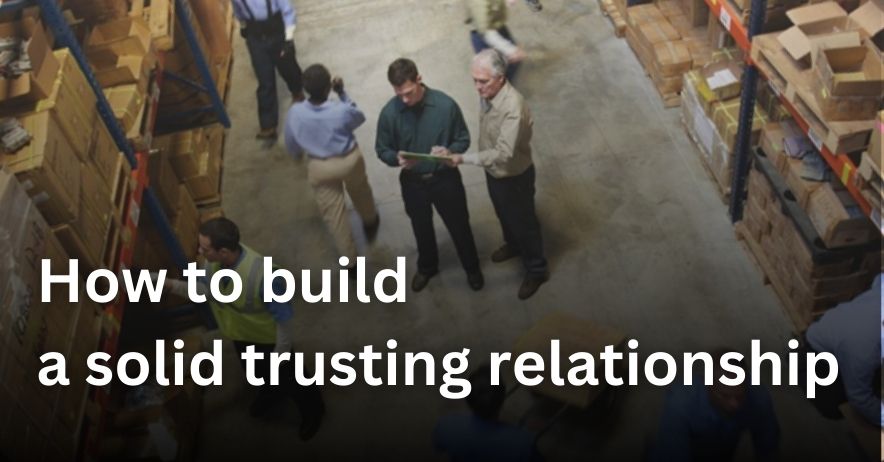How to build a solid, trusting relationship…

Encountering trust issues? The best way to know if you can trust somebody is to trust them. What if you’re working with someone who won’t? Here’s how you can go about building it.
Trust and OPM Trust.
It’s a belief, not a commodity.
It’s earned, not traded.
It’s strong enough to hold relationships - from couples to countries – together.
Yet it can collapse like a house of cards.
The problem in entering a new relationship is that you don’t always have the luxury of time to build that trust. You must be willing to take a chance. But, in a new business relationship using OPM (other people’s money) there’s little appetite for chance.
Enter the lawyers! The Guardians of OPM armed with their contracts - signed pieces of paper that document trust. Contracts make the OP happier. But when you’re the one to deliver this new business relationship, you still need to build trust.
Your hard work is all in front of you.
How do you start when faced with a trust-deficit?
The foundation of trust is the same anywhere, in anything, for anyone.
- Open communication,
- Transparency in dealings,
- Fulfilling commitments,
- Acting with integrity, and,
- Working towards shared goals.
But that’s where trust takes time to build. If your new business relationship begins with a trust-deficit, this will take longer. Several customers I have spoken with recently shared a similar trust-deficit story. Their WMS selection team members and management was split.
Some viewed the proposed WMS as a cost, not an investment. Some of the client’s team maintained the trust-deficit after contracts were signed:
“They’re over-servicing us.”
“They’re giving us more than we need at a higher price than we need to pay.”
“It’s all good for them, bad for us!”
During those critical first days of a WMS implementation, remediation was essential. Focus was on setting up for a successful relationship. This meant addressing the opening trust-deficit.
To address the deficit, it was essential to:
- Establish a rapport. The first step was to get to know the glass half-full team members on a more personal level. Simple techniques that worked including sharing a coffee, lunch, or cab ride. Even sharing a minor, embarrassing incident from the weekend. Anything to break the ice.
- Establish clear expectations for both parties. These expectations address drivers of the trust-deficit, preventing any further erosion of trust.
- Focus on shared goals. Establish common ground where you work together to avoid a “we have our work” and “you have yours” situation. One single project task list where there’s no split meetings to work on issues.
What do you do with a “glass half-empty”?
There's no reason for the trust-deficit to exist. It's often down to human nature. Some people are “glass half empty” types. Some people have been burnt in previous vendor relationships. Some have been on the wrong side of a power imbalance. Bad experiences have left them cynical when it comes to investing in anything new. Their starting point is an unwarranted position of distrust.
The customers I spoke to all agreed on one point. Any "glass half empty" could be topped up with unpolished testimonials. Direct, previous customers contacts also worked wonders. To speak to similar “glass half-empty” people was to reduce their cynicism.
Reinforce the Win/Win
The default position of the “glass half-empty” people is a trust-deficit. They’re black and white view is of a power imbalance. A supplier always has the upper hand in the relationship. As the subject matter expert, they use their position to their own advantage.
These customers I spoke with said that this faulty mindset can be re-set before making a decision. They need convincing that a supplier needs a successful customer. An adversarial supplier that aims to “defeat” a customer is undermining its own market. A supplier that aims to “enhance” a customer’s position is growing its own market. With this mindset of a common goal, mistrust began to melt.
Achieving a trust-balance and beyond
A good WMS Implementation Team can address a client team member's trust-deficit. There are no dark arts involved. No complex MBA- management theories to apply.
The WMS Implementation Team earns that trust when it focuses on its drivers. These several customers I spoke with emphasised the same simple types of practices:
- Communicating clearly and regularly.
- Hitting agreed deadlines.
- Maintaining transparency.
- Training the end-users well
- Addressing any technical issues that may arise.
Together, these built trust and opened the way for their successful WMS implementations.
The bottom line
Your WMS Selection Team may not all agree during the selection process, and nor should it. Alternate views spark insights. What is critical is that the team considers all views leading into its final decision. In any group of reasonable people, any trust-deficit is temporary. An experienced WMS Implementation Team can restore balance. It can build a solid, trusting business relationship.
TAGS
- WMS (51)
- Warehouse Best Practice (46)
- Implementing a WMS (29)
- Managing your warehouse (19)
- Omni Channel (18)
- eCommerce (18)
- Blog (16)
- Supply Chain Best Practice (16)
- Customer Journey (9)
- Mid-Level (8)
- Warehouse optimisation (7)
- General Tips (5)
- Industry General (5)
- Information (5)
- Trends (5)
- managing your Supply Chain (5)
- saudi arabia (5)
- Press Release (4)
- smart warehouse (4)
- 3PL (3)
- News (3)
- ERP (2)
- Entry-level (2)
- ROI (2)
- Case Study (1)
- OMS (1)
- Picking (1)
- Solution-Specific (1)
- Transport Management System (1)
Take A Look At The Results Of A Successful WMS Implementation.
See how Tarsus Distribution, in collaboration with SCJ boost overall efficiency by 60%



